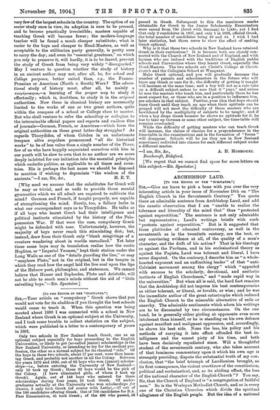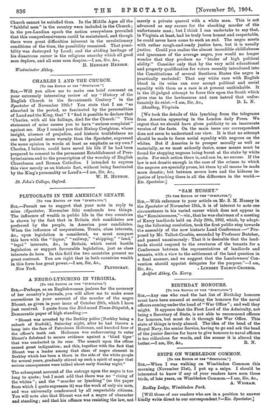SIE,—Give me leave to pick a bone with you over
the very interesting article in your issue of November 19th on " The English Church in the Seventeenth Century." You quote there an admirable sentence from Archbishop Laud, and add the caustic observation that I am " unable to realise the tolerance and liberality of the mind that" thus "protested against superstition?' The sentence is not only admirable but representative ; Land's writings bristle with such " protests against superstition." But is it suggested that these platitudes of educated controversy, as well in the seventeenth as in the twentieth century, are the best, or any convincing evidence at all, of the quality of a man's character, and the drift of his action P That in his theology as against the Puritans, and in his ecclesiastical theory as against the Papists, Laud was tolerant and liberal, I have never disputed. On the contrary, I describe him as " a whole- hearted exponent and an unflinching leader " of that " anti- Calvinist movement among the clergy" which "appealed with success to the scholarly, devotional, and aesthetic instincts of English Churchmen," and "made rapid way in the universities." But when all is said, the hard fact remains that the Archbishop did not impress his best contemporaries as either tolerant, or liberal, or lovable, or wise ; and he was the immediate author of the great catastrophe which reduced the English Church to the miserable alternative of exile or anarchy. The admirable sentiments which adorn his writings are to be discounted by two circumstances. On the one hand, he is generally either girding at opponents even more intolerant than himself, or he is standing on his own defence against manifest and malignant oppression, and, accordingly, he shows his beat side. None the less, his policy and his methods of carrying it into effect offended the best in- telligence and the sanest piety of his time, and both have been decisively repudiated since. Will a thoughtful student of the seventeenth century, who also takes account of that luminous commentary upon it which his own age is strangely providing, dispute the substantial truth of my con- clusion, that "the brief triumph of Laudianiem brought, as its first consequence, the violent overthrow of the constitution, political and ecclesiastical, and, as its abiding effect, the loss of the national character of the English Church " P You say, Sir, that the Church of England is " a congregation of faithful men." So is the Wesleyan Methodist Church, and so is every one of the Christian Churches which divide the spiritual allegiance of the English people. But the idea of a national
Church cannot be satisfied thus.. In the Middle Ages all the "faithful men" in the country were included in the Church ; in the pre-Laudian epoch the notion everywhere prevailed that this comprehensiveness could be maintained, and though there were great difficulties inherent in the revolutionary conditions of the time, the possibility remained. That possi- bility was destroyed by Laud; and the abiding heritage of his disastrous career is the religious anarchy which all good men deplore, and all sane men despise.—I am, Sir, &c., H. HENSLEY HENSON. Westminster Abbey.















































 Previous page
Previous page